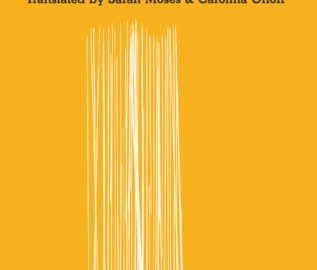Ariana Harwicz, Die, My Love (Matate, Amor), Charco Press, 2017. Translated by Sarah Moses and Carolina Orloff.
Accuracy “I’ve been needing the loo since lunch but it’s impossible to do anything other than be a mother. Enough already with the crying. He cries and cries and cries. I’m going to lose my mind. I’m a mother, full stop. And I regret it, but I can’t even say that. Who would I say it to? To the boy sitting on my lap, sticking his hand in my plate of cold leftovers, playing with a chicken bone? No! Leave that alone, you’ll choke. I chuck him a biscuit. He gives it back. […] I call my husband. I need reinforcements. While I’m dialling, the baby hangs off one of my shoulders. He’s going to tear me apart. […] Hello, listen love, I need you to come home now, I can’t go on like this. […]”
Yes, I think we can agree just from this passage that Die, My Love is pretty unflinchingly accurate in describing the daily routines of a stay-at-home mother caring for her tiny son, as an outsider marooned in the French countryside her husband calls home. Told almost exclusively from her perspective (by turns fervid and comic), this short book follows an obsessive love affair against the background of a relationship stifled by parenthood.
Empathy As above, full marks for empathy. The unnamed mother struggles to reconcile to a life violently re-shaped by childbearing (“I’m one person, my body is two”) while her husband seems happier pretending nothing is wrong (even suggesting they have another one). The narrator’s behaviour is troubling beyond the point of self-parody (she walks through a glass door; screams death threats at her husband; shoots an injured dog; identifies herself with the wild beasts of the forest) yet, even after an inconclusive spell in a therapy centre, everyone continues to trust her to look after her child. While at times her narrator’s tantrums and obsessive sexual fantasies challenge belief, Harwicz has a keen eye (and her translators have a keen ear) for the petty details that bedevil motherhood, like the narrator forgetting to pack a snack for her son on a visit to friends, or an outing to the seaside spoiled by the parents’ incompatibility(“It wasn’t until we were driving over the white lines of the road in complete silence that we realized we hadn’t even taken our son into the sea”).
Style Now jagged, now lyrical, always throwing questions at the reader and herself, moving in a heartbeat from desire and affection to fury and sadism, Harwicz’s narrator’s style is absurdly engaging, even contagious. There are nappies and pizzas, but there are also chainsaws and shotguns. Best not read around one’s children. Harwicz doesn’t just flag up the absurdity of motherhood; her narrator is gunning for the entire human condition. Here are some gems:
“My ovaries wring themselves out and there’s a blood clot in my knickers that runs down my legs. I don’t think I’m pregnant again, it’s just pure rage.”
“I hope the first word my son says is a beautiful one. That matters more to me than his health insurance. And if it isn’t, I’d rather he didn’t speak at all. I want him to say magnolia, to say compassion, not Mum or Dad, not water. I want him to say dalliance.”
“She lived in her body as though it were an infested house, as if she had to tiptoe through it trying not to touch the floor.”
The Pregnancy Test: Positive The Guardian regularly gives space to discussion of post-natal depression, which is important and laudable. It is even more important, however, to acknowledge the range of post-natal experience, positive and negative, depressive and obsessive; and to encourage women to talk about the shattering mental and physical experiences that come with giving birth to a baby and continue throughout the early years of motherhood. A recent contributor writes: “Nothing prepares you for the onslaught and the exhaustion, mainly because we don’t yet talk about motherhood honestly enough. We don’t talk about the “normal” brokenness nearly enough. I suppose a comparison could be bereavement, where it is arguably “normal” to feel broken for a while after losing a loved one. But if that brokenness goes on, month after month, to a point where someone feels like they can’t get their life back, then it needs to be addressed.” The importance of Harwicz’s book for readers is that she does address the “brokenness” of mothers but without pigeonholing this experience as PND. While sharing the metaphor of bereavement, Harwicz’s narrator’s experience transcends PND the way a planet eclipses a moon: “I was in mourning for a long time, but there came a moment when, like the widow who unlocks her front door for the first time, who eats dinner in silence for the first time, who gets into bed alone for the first time, I felt a sadness that was exhilarating, wild.”
